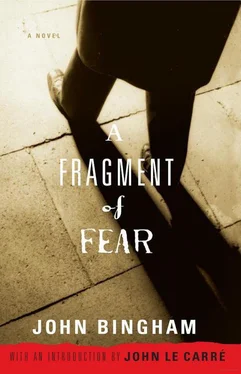John Bingham - A Fragment of Fear
Здесь есть возможность читать онлайн «John Bingham - A Fragment of Fear» весь текст электронной книги совершенно бесплатно (целиком полную версию без сокращений). В некоторых случаях можно слушать аудио, скачать через торрент в формате fb2 и присутствует краткое содержание. Жанр: Триллер, на английском языке. Описание произведения, (предисловие) а так же отзывы посетителей доступны на портале библиотеки ЛибКат.
- Название:A Fragment of Fear
- Автор:
- Жанр:
- Год:неизвестен
- ISBN:нет данных
- Рейтинг книги:3 / 5. Голосов: 1
-
Избранное:Добавить в избранное
- Отзывы:
-
Ваша оценка:
- 60
- 1
- 2
- 3
- 4
- 5
A Fragment of Fear: краткое содержание, описание и аннотация
Предлагаем к чтению аннотацию, описание, краткое содержание или предисловие (зависит от того, что написал сам автор книги «A Fragment of Fear»). Если вы не нашли необходимую информацию о книге — напишите в комментариях, мы постараемся отыскать её.
A Fragment of Fear — читать онлайн бесплатно полную книгу (весь текст) целиком
Ниже представлен текст книги, разбитый по страницам. Система сохранения места последней прочитанной страницы, позволяет с удобством читать онлайн бесплатно книгу «A Fragment of Fear», без необходимости каждый раз заново искать на чём Вы остановились. Поставьте закладку, и сможете в любой момент перейти на страницу, на которой закончили чтение.
Интервал:
Закладка:
The superintendent took no notice. He said:
“Have you been victimised much in your life, Mr. Compton? Had much bad luck, one way and another? Made a lot of enemies, through no fault of your own? That sort of thing?”
I shook my head and gathered my packet of cigarettes and lighter from the table and put them in my pocket. There was nothing more I could say.
I was feeling the heat from the electric lighting, and the voices of the superintendent and sergeant were not so clear, and the noises of the traffic outside had grown dimmer. I had a feeling of panic, an impression that I was indeed losing my grip on reality.
“I can describe him,” I heard myself say.
“Describe who?” said the sergeant. “The unknown voice who rang you up?”
“He was a middle-aged sergeant,” I went on doggedly, “with a fresh complexion, and a bald head, and he was rather stout, and he had brown eyes.”
They were looking at me placidly, as people look at a child reciting a poem. But I forced myself to go on.
“He came on a bicycle, and wore bicycle clips on his trousers. And he said his name was Matthews, Sergeant Matthews, of Kensington Police Station. You say he doesn’t exist and couldn’t have brought a complaint. Can’t you suggest something? Can’t you help me? What am I to think?”
I rubbed my forehead with the fingers of my right hand, and looked down to where the superintendent was still sitting at the table, and saw him watching me with more attention.
“Why did you go to Italy, where this Mrs. Dawson was killed?” he asked quietly.
“I’d had a car accident and was a bit run down. My legs had been slashed a bit,” I said indifferently, and moved to the door.
“They say car accidents can make you sleep badly,” he said, getting to his feet.
“Yes, I was sleeping badly. I’m all right now, though.”
“I’m sure you are.”
“Nasty shock, a bad car accident,” said the sergeant mildly.
The superintendent asked:
“Did you sleep well in Italy?”
“After the first few days.”
“Chap I knew was in a car accident,” said the sergeant. “Went round for some time afterwards thinking he’d got a radio set in his head. All right now, though. Still, it just shows.”
I paused and stared at him.
“That’s usually a sign of schizophrenia. That’s not delayed shock. That’s got nothing to do with car accidents,” I said quickly.
“Hasn’t it, sir? Well, maybe he was schizo anyway. Better now. They cure all sorts of things these days.”
He had dropped his hectoring tone. He got to his feet, and took a packet of cigarettes from his pocket and offered me one.
The three of us stood near the closed door of the waiting-room. Almost like three acquaintances who had satisfactorily concluded a difficult business deal, except that my stomach muscles were still contracted and I wanted desperately to get out of the place. But the superintendent was leaning against the door, and the sergeant was near him, and I was on the inside of the room.
“Well, I must go now,” I said firmly, and walked towards them, but they didn’t move. I had to stop. The grey superintendent glanced casually at me, and then back to the sergeant. They began talking between themselves, as if I wasn’t there.
The superintendent said, yes, of course, it was a question of early diagnosis, and early treatment, like everything else in medical matters. The sergeant said, “well, yes, sir, but that was the whole difficulty, getting people to have treatment, especially in certain cases.
“You can’t get ’em certified,” he said in a low voice, “unless they’re right round the bend, I mean, so long as they can look after themselves, more or less-and probably less than more-and so long as they’re not causing what you might call a public nuisance, you can’t do anything about it. And that’s the trouble.”
The superintendent said:
“And more’s the pity, both for their sakes and everybody’s.”
“They’ve got to go voluntary,” said the sergeant.
“Doctors are reluctant to certify,” said the superintendent, “and it’s not surprising-one mistake, and bingo, they’re sued for damages. It’s a pity, really.”
“It is, sir.”
“A bit of treatment, and they’re free of it all. No more radio sets in their heads, no more voices out of the ether, no more feeling that the whole world’s against them, spying on them, and all that lark. They’re happy.”
“But they won’t go, sir. They won’t go, not voluntarily,” said the sergeant regretfully.
I felt that if I didn’t leave at once that very instant, the pressure building up inside me would burst, and I would jump at the door, and push them aside, and run out, though I knew I wouldn’t get far.
They were too cautious, too experienced, to say what they meant openly to me. They accepted that I had been in the same train as sad Bunface. They had to, because I had described her so minutely.
But they didn’t accept anything else.
They thought I heard voices, and dreamed dreams, and saw visions. One had the impression that in a long career of interviewing all sorts and kinds of people, they had formed mental patterns of how people behaved in certain circumstances, and what could happen and what could not.
“It’s been a waste of time,” I said bitterly. “Your time and mine. You can’t cope, and I suppose I don’t blame you, because you’re faced with a situation you’ve never experienced before.”
“Oh, yes, we have,” said the sergeant defensively.
“There’s just one last question, sir,” said the superintendent, making no move from the door.
I was wondering when they would ask it.
“Go on,” I said, “I can guess it.”
“It’s just a formality, Mr. Compton, nothing for you to worry about. More a question of tidying up loose ends, if you know what I mean, seeing that you’ve come forward and admitted to an encounter with this Paradise Lane woman, which we didn’t know about-and seeing that you got the idea she laid a complaint against you. If we can just clear it up now, then there won’t be anything more to worry about.”
“No, nothing more to worry about,” I muttered.
“Where were you between say eleven-thirty last night, and one-thirty this morning, sir? That’s putting it a bit baldly, of course, but it’s just for the record. You’re an intelligent man, and-”
“Am I,” I interrupted sharply. “Am I indeed? Just now you were saying I needed mental treatment.”
I saw them both stiffen, suddenly look less relaxed, more alert. When the sergeant spoke he could have been addressing a child of ten. He didn’t exactly pat me on the head, but his tone was patient and coaxing.
It nearly made me sick.
“Now, now, now, sir, the superintendent wasn’t saying any such thing, were you, sir? Nor was I.”
“We were just making a few general remarks, Mr. Compton. I don’t think you have any call to suggest we meant them personally.”
“No call at all,” said the sergeant.
I turned away from them and walked to the opposite side of the room. As I did so, I heard the superintendent say:
“I have to inform you, Mr. Compton, that if you would rather say nothing, and await the arrival of a legal adviser, that is your right.”
I swung round and looked at them, the tall, grey one, and the shorter fawn one, so different in appearance, so different in manner: one apparently kindly, one mostly harsh and rasping. A good orchestration. Lifting you up and slapping you down. But both tired and over-worked. I think it explained a good deal.
I shook my head.
“I know all that. I don’t need a legal adviser to recall to me what I was doing for a couple of hours last night.”
Читать дальшеИнтервал:
Закладка:
Похожие книги на «A Fragment of Fear»
Представляем Вашему вниманию похожие книги на «A Fragment of Fear» списком для выбора. Мы отобрали схожую по названию и смыслу литературу в надежде предоставить читателям больше вариантов отыскать новые, интересные, ещё непрочитанные произведения.
Обсуждение, отзывы о книге «A Fragment of Fear» и просто собственные мнения читателей. Оставьте ваши комментарии, напишите, что Вы думаете о произведении, его смысле или главных героях. Укажите что конкретно понравилось, а что нет, и почему Вы так считаете.












